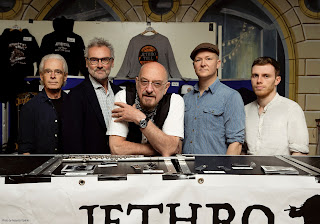Saturday, 23 September 2023
Monday, 17 April 2023
REVIEW: RökFlöte by Jethro Tull
Release Date: April 21st, 2023
Formats available: Ltd. Deluxe 2LP+2CD+Blu-ray Artbook / Ltd. Deluxe 2CD+Blu-ray Artbook / Special Edition CD Digipak / Gatefold LP & LP-booklet / Digital AlbumAll songs written and composed by Ian Anderson
REVIEW
There are different types of fans. Those who like a band and have a few albums, perhaps a greatest hits CD, and then there are those who devour everything released by a band, bootlegs, outtakes, demos and all. When it comes to Jethro Tull, I am definitely the former. I consider Thick As A Brick and Aqualung to be two of my favourite records, but I do not own all of the band's albums. I have listened to lots of them, but not all, and I have never seen the band live, though I would love to.
But that said, I know enough about the band and the flautist frontman to be overjoyed when I got a chance to get an early copy of their 23rd studio album, RökFlöte, and an invite to interview Ian Anderson for the Rock, Paper, Swords podcast I co-cost with Steven A. McKay (who is, incidentally one of the aforementioned mega fans who possibly knows more about Tull than Ian Anderson himself!). As we both write about the early medieval and Viking Age, and love rock music in general and Jethro Tull more specifically, life couldn't really be better!
I've also recorded a review with Steven of RökFlöte on Rock, Paper, Swords.
LISTEN HERE:
And make sure you SUBSCRIBE to the podcast so you don't miss the interview with Ian Anderson we have scheduled for a couple of weeks' time!
When I received the link to the tracks, I started to listen with muted expectation. I hadn't listened to much recent Tull and I had heard that Anderson's voice had deteriorated since the band's heyday. But as each track ran into the next with fluid conceptual and sonic harmonies, I realised I was in safe hands.
RökFlöte is a concept album. Inspired by Anderson's surname with its Scandinavian roots and his interest in religion and esotericism, in this case the Norse mythos and its gods.
The 12 songs are based on the characters and roles of some principle gods of the old Norse paganism.
Anderson explains: "Each set of lyrics was written in the form of a lyric poem with the first 6 stanzas of either Trochaic Octameter or, arguably, 12 stanzas of Iambic Tetrameter to describe the settings, identities and personalities of the different gods. The final four stanzas of each song except the first and last tracks, are a different personalised interpretation of those subjects in a more contemporary setting."
So there you have it! If it sounds a bit pretentious and over the top, Anderson doesn't care. He just wants to get on with making interesting and thought-provoking music. And I have to say, here he succeeds.
The themes of the songs might be uncomfortable to some more fundamentalist relgious listeners, with their strong links to paganism, but as Anderson says: "I am not here to promote the old Norse religion or, indeed, any religion. My own preference is for the ultimate esotericism of Panentheism. I see no need for imaginary man-made visual representations of God. No need for symbols, idols, icons, relics and the ritual of prayer to an interventionist god. Problem is, it might make for rather a dull rock music album...."
The album was originally conceived as an instrumental focusing on Anderson's famous brand of "rock flute" and despite evolving into a more classic style prog rock album with lyrics, the flute is front and foremost throughout, without ever overstaying its welcome.
The album opens with Voluspo, in which we hear deep breathing (perhaps a supreme being breathing life into the world) and spoken word from the Icelandic actress, singer and musician, Unnur Birna, who reads from the Icelandic Poetic Edda. Here the melodic flute and guitar solos contrast well with the flat, spoken words.
Next up is Ginnungagap, which features chugging guitar, more flute, and then a bass-heavy build up. The flighty flute soars with catchy flourishing and motifs. Anderson's voice sits well in the mix. Here he sings with melody, but with some restraint.
Allfather is an upbeat affair with almost floral opening bars. This is followed by what seems to be a chanting refrain, a call to the Allfather (Odin, though, surprisingly, he is not mentioned by that name here). The half-spoken lyrics are accentuated by the drumming.
The same musical motifs and tune as Allfather start the next song, The Feathered Consort, that moves into a softer sung vocal melody. Time signature changes keep you listening, but this is one of the weaker tracks on the album for me.
Hammer On Hammer was released as a single and with reason. It is a strong track and my favourite on the album. After a quick flute intro, Anderson delivers the great opening lines: "Was there a time when I was Jupiter, Ringed like Saturn, with sacred belt? Anvil sweating under blows, Hammer on hammer, cold steel to smelt."
The vocal melody is interspersed with guitar, keyboard, and flute responses. The video is interesting too and showcases both the Norse myth aspect, as well as Anderson's modern references to Armageddon and Valdimir Putin. If Anderson's falsetto is a bit forced, the rest of the singing is strong, dropping into speech for emphasis (e.g. “At Ragnarok...”). Joe Parrish-James' guitar work is outstanding here too, with a wonderful double-tracked, harmonised guitar solo. Like a couple of songs on the album, this one does end rather abruptly!
Wolf Unchained starts with a plaintive howl, then moves quickly into a great rock song. Power chords, dancing flute, light keyboards, and driving drum beat, all push the song along. Well-sung vocals (at times awash with reverb) sit well atop David Goodier's toe-tapping bass line and Scott Hammond's drums. The flute solo soars briefly, then intertwines with the guitar. I particularly liked the alusion to modern dogs, “dreaming of a wilder past” wanting to disembowel the postman’s corpse!
As the strains of the wolf's howl fade away, we hear the slower, more melodic acoustic guitar and flute of the intro to The Perfect One, before the distorted guitars and drums kick in. This track has fewer dynamics than the other songs, and is quite forgettable… I would probably rate this as the weakest song on the album.
Luckily, the next number is Trickster (And The Mistletoe). This gets off to a flying start with staccato flute riffing off drums and guitar. This up tempo sing feels very “folky”, and I think I detected echoes of Songs from the Wood. The syncopated rhythms and classic-sounding folk melody could be part of a medieval song. It builds into a great guitar and flute battle.
Next up is Cornucopia with its pastoral flute and acoustic guitar. The lyrical melodies speak of fruit and flowers. This is the perfect composition for the song title and it is easy to imagine trees heavy with juicy fruit on a summer evening.
The Navigators tackles the seafaring Norse and modern sailors. Thrusting guitar and bass lines mirror the flute. The vocals are punchy and tuneful. The guitar, bass and flute lines blend well as trilling keyboard accents fly up and down like surf on the wind.
Guardian's Watch begins like a song from another time, the 17th century perhaps. Flute and what sounds like a harpsichord. This quickly gives way to guitars, bass and drums with keyboard stabs converting effortlessly into a solid heavy rocker.
The last song is Ithavoll, in which we return to Unnur Birna speaking words of the Icelandic sagas.
The flute almost sounds like a bird call at the beginning. Stabs of guitar and bass take over, then the keyboards and drums come in, before overdriven guitar picks up the mournful refrain. Some of the complex keyboard here reminded me of early Marillion.
At the end Anderson delivers breathless vocals that feel slightly forced and strained, the fact they don't rhyme or really seem to fit with the music doesn't help and somehow makes them less potent too. This leads to a slightly flat ending to what is a powerful record for the most part. We end as we began, with deep breaths… of creation? Or exertion from all that flute playing? Who knows?
Conclusion:
I really enjoyed this album. The flute is very prominent in all songs (which, is apt for the title), but it is never too much. There are moments reminiscent of classic Tull, while still sounding modern. In many places the guitar, flute and bass mirror each other, but there are many intricate flute and guitar interwoven solos. The whole album has a cohesive sound and feels part of a single entity. RökFlöte is a strong, assured concept album that will satisfy Tull fans.
Band members:
Ian Anderson - Flute, vocals
David Goodier - Bass guitar
John O’Hara - Piano, Keyboards and Accordion
Scott Hammond - Drums
Joe Parrish-James - Guitars, mandolin
RökFlöte Tracklist:
1. Voluspo - 00:03:42
2. Ginnungagap - 00:03:48
3. Allfather - 00:02:44
4. The Feathered Consort - 00:03:37
5. Hammer On Hammer - 00:03:09
6. Wolf Unchained - 00:04:58
7. The Perfect One - 00:03:49
8. Trickster (And The Mistletoe) - 00:03:00
9. Cornucopia - 00:03:51
10. The Navigators - 00:04:26
11. Guardian's Watch - 00:03:28
12. Ithavoll - 00:03:53
JETHRO TULL ONLINE:
https://www.facebook.com/officialjethrotull/
https://twitter.com/jethrotull
Tuesday, 14 February 2023
REVIEW: Usurper (The Wulfbury Chronicles Book 1) by P. W. Finch
 Usurper: an epic medieval adventure by P. W. Finch
Usurper: an epic medieval adventure by P. W. FinchMy rating: 4 of 5 stars
Usurper is an action-packed, coming-of-age, adventure set against the upheaval and battles of 1066. Finch gives us Cerdic, a troubled hero thrown into the maelstrom of events outside of his control, and we follow him breathlessly as he deals with brutal Vikings, familial rivalries, unrequited love, invading Normans and more!
View all my reviews
Subscribe to:
Comments (Atom)




